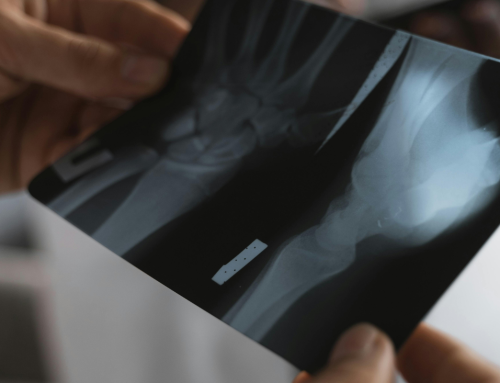Fracture recovery isn’t just a medical process. It’s a physical, financial, and emotional balancing act. And if you’re juggling healing with work responsibilities, understanding how to request modified duties after a fracture is an essential (and often overlooked) part of healing.

TL;DR: Asking for Modified Duties After Injury
- Fractures can affect your ability to work—physically and emotionally.
- Modified duties after a fracture may include flexible hours, remote tasks, or reduced physical strain.
- Start the conversation with a doctor’s note and a collaborative attitude.
- Reassess often. Healing timelines aren’t fixed. Adjust your work plan as your recovery evolves.
- LIPUS bone stimulation therapy may help you heal faster and return to full duties with confidence.
How Fractures Can Impact Your Job Duties
Fractures can make work feel more difficult than expected. Pain, fatigue, limited mobility, and even brain fog from medications can interfere with your focus, productivity, and ability to complete regular job tasks.
- Desk jobs might be affected by sitting discomfort, typing limitations, or lack of stamina.
- Physical jobs can pose safety risks due to lifting, standing, or movement restrictions.
- Customer-facing or shift work can become stressful due to disrupted sleep or medication effects.
Beyond the physical effects, the psychological impact of fractures, particularly long bone fractures, can be just as significant. According to a scoping review, patients recovering from serious fractures often experience post-traumatic stress disorder (PTSD), depression, anxiety, and fear of re-injury. These challenges can result in prolonged time off work after a fracture, especially for those without proper rehabilitation or modified duties after injury. Hence, having the right fracture recovery plan is paramount.
Tips for Talking to Your Employer or HR Manager
When speaking with your employer or HR manager, how you present yourself and the language you use can make a meaningful difference. Frame your request as a medical necessity and a workplace safety consideration, rather than a personal preference.
→ Lead with medical reasoning.
"My physician recommends I temporarily adjust some of my tasks to avoid delaying recovery. I’d like to work with you to create a plan that supports both my healing and my ability to contribute to the team."
→ Be prepared with documentation.
A doctor’s note can clearly outline your restrictions and reinforce your request.
→ Stay calm and constructive.
Reinforce that you’re committed to recovering responsibly and returning to full duties when safe.
→ Collaborate on solutions.
Offer ideas for how your role could be temporarily modified, and express your desire to continue contributing meaningfully during recovery.
Modified Duties vs. Full Leave: What’s Reasonable to Request?
Not every fracture requires full medical leave. Modified duties are often a flexible option, especially if your job can be adjusted to minimize physical strain.
You might ask for:
- Reduced hours or part-time shifts
- Remote work (if feasible)
- Reassignment to non-physical or less demanding tasks
- Breaks for elevation, icing, or rest
If your job can’t be adjusted, or your symptoms are severe, time off may be necessary. This is especially true after surgery or for weight-bearing fractures. In that case, full medical leave may give your body the best chance to heal.
Examples of Modified Duties After Injury
- Desk or Office Jobs:
- Voice-to-text software
- Extra breaks for movement or elevation
- Remote work setup with ergonomic accommodations
- Physically Active Jobs (healthcare, trades, etc.):
- Seated assignments like intake, dispatch, or coordination
- Adjusted schedules to allow for rest or recovery time
- Lighter tasks or observation-based roles
The goal is to keep you engaged in work without risking re-injury.
The Emotional Side of Returning to Work During Fracture Recovery
Healing from a fracture often brings emotional challenges. You may worry about being seen as unreliable—or fear letting down your team.
But pushing through pain or pretending you’re back to 100% can backfire. Re-injury, burnout, or delayed healing are very real risks.
Give yourself grace. Healing is hard work, and returning to your job with modified duties is still showing up and contributing. Talk to your care provider, HR team, or a counselor if you need extra support.
How Bone Stimulation Therapy Can Support a Faster, Safer Return to Work
If you’re eager to return to work or want to keep your recovery on track while managing job responsibilities, consider bone stimulation therapy.
The Melmak LIPUS device uses Low-Intensity Pulsed Ultrasound (LIPUS) to send gentle sound waves to your fracture site. These waves stimulate the cells that help bones regenerate and repair.
It’s clinically backed, discreet, and easy to use at home or work—just 20 minutes per day. You can use it while resting, reading, or even on a break at your desk.
Studies show that LIPUS can speed up fresh fracture healing by up to 38% and support non-union healing in up to 86% of cases.
For those balancing work and recovery, it’s a smart way to stay proactive without requiring extra appointments or downtime.
When to Re-Evaluate or Re-Negotiate Your Work Plan
Fracture recovery isn’t always linear. Maybe you’re feeling better sooner than expected. Or maybe healing is taking longer.
Either way, it’s worth checking in:
- Are you managing your tasks comfortably?
- Is pain or fatigue affecting your performance?
- Has your care provider cleared you for more (or fewer) duties?
Your plan should evolve with your body. Whether you need to scale back temporarily or step things up, honest updates with your doctor and employer help ensure work remains a supportive part of recovery—not a setback.
Protect Your Healing, Support Your Progress
Modified duties are a tool, not a setback. With the right workplace support, you can protect your healing timeline and reduce the risk of re-injury. Pairing a modified work plan with proactive strategies like bone stimulation therapy can make recovery more efficient and less disruptive.
👉 See who benefits from LIPUS therapy →





